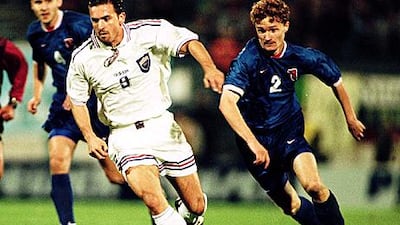As Serbia take on Northern Ireland, Ian Hawkey looks back at the the gory days of the former Yugoslavia and how its component states have fared on their own
Twenty years ago tomorrow, in Belgrade, Yugoslavia took on Northern Ireland in a European Championship qualifying match. Funny, the tricks history plays.
The date then was March 27, 1991. On March 25, 2011 - last night - Northern Ireland had a game in Belgrade for a place among the finalists at the next Euros. The big difference, of course, was that the home team now have a different name: it is Serbia who play in Belgrade.
One painful distinction for locals is that while the Yugoslavia of March 1991 were romping to the top of a Euro '92 qualifying group, the Serbia of 2011 have ground to make up.
In Group C of the Euro 2012 qualifying competition, Serbia have already forfeited points because of crowd violence blamed, quite rightly, on Serbian fans who caused the abandonment of last October's fixture in Italy. Nor would it be wrong to conclude that football in that area of the Balkans has a culture of supporter violence. But it has been like that for a long time, and the best that can be said is that at least that aggression is no longer a fringe symptom of the bloody civil and military conflicts that were beginning to engulf the region 20 years ago.
The old Yugoslavia, who beat Northern Ireland 4-1 that March night in 1991, finished top of their qualifying group. They were the team of Robert Prosinecki, Zvonimir Boban, Dragan Stojkovic and Darko Pancev, the man who scored more goals than anyone in all qualifying for Euro '92. He, Prosinecki and the brilliant Dejan Savicevic would win the 1991 European Cup with Red Star Belgrade. But none would make it to the finals of the European Championship, where Yugoslavia would have begun among the favourites.
A United Nations ban on Yugoslavia's external relations had, by the following June, come into effect, and spread its mandate to the "national" football team. Denmark, who finished beneath Yugoslavia in qualifying, and were the only side to have taken points off them in two years, went on to win the Euro title in 1992.
Jump forward to now, and the map of eastern Europe is transformed. So is its football.
Just as the Balkans were breaking up, often through war, into sovereign states that had been formerly merged as Yugoslavia, the so-called "Russian bloc" was disintegrating. Ukraine will joint-host Euro 2012: Twenty years ago Ukraine was just ceasing to be part of the Soviet Union, a single state. At the 1992 Euros, held in Sweden, eight finalists competed. The number is now set at 16 and will swell soon to 24. This might seem overweight for a finals, but the fact is Europe simply has many more countries than it once did.
Just ask Northern Ireland.
On Tuesday they play Slovenia in another Group C qualifier. Twenty years ago, in their match against Yugoslavia, they would have been playing Serbs and Slovenes at the same time.
Of the former Yugoslav states, Slovenia declared its independence first, in 1992, and by the beginning of the new millennium, they were themselves in a major finals, Euro 2000, the first of several admirable achievements for a country with a population of just over two million.
At the last World Cup, their second after 2002, Slovenia were the team representing the smallest nation in the tournament, and in a sense they have been a guiding light for many "new" Balkan sides.
Like Montenegro, for instance. Montenegro, who joined Uefa in 2007, this morning sit top of Euro 2012 qualifying Group G, which contains England, and their success joyfully stirs the memories of men like Predrag Mijatovic, a former Yugoslavia international, a Champions League winner with Real Madrid and always, like Savicevic, a patriotic Montenegrin.
"Did I ever dream of wearing the jersey of independent Montenegro? It just seemed out of the question at the time," said Mijatovic, now 42.
"We were part of Yugoslavia, and had to make our way in that country. And our generation did it very well.
"What has not changed, even though we are now a small nation, with a population of only 700,000, is that football is Montenegro's number one sport."
In Bosnia-Herzegovina, the same would be said. Bosnia, a territory that two decades ago was suffering grotesque human rights abuses encouraged by Serbian, Croatian and even local warlords, now has a fine football team, who came within a play-off of the last World Cup finals.
Macedonia, Pancev's country, have another individual European Cup winner, as of last May, in Inter Milan's Goran Pandev. And Croatia, the team who led the way for the independent Balkan states by finishing third at their first World Cup, in 1998, are on the rise again.
They play Georgia today as leaders of their qualifying group.
So, it should not be long before someone from what used to be known as Yugoslavia enters a European championship as hotly-tipped a dark horse as the last, multi-nation Yugoslavs were two decades ago.


